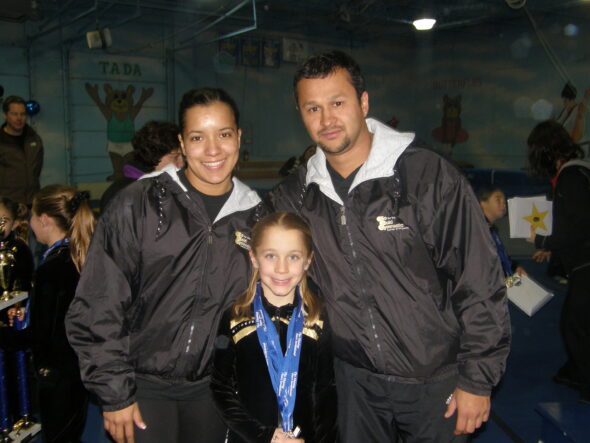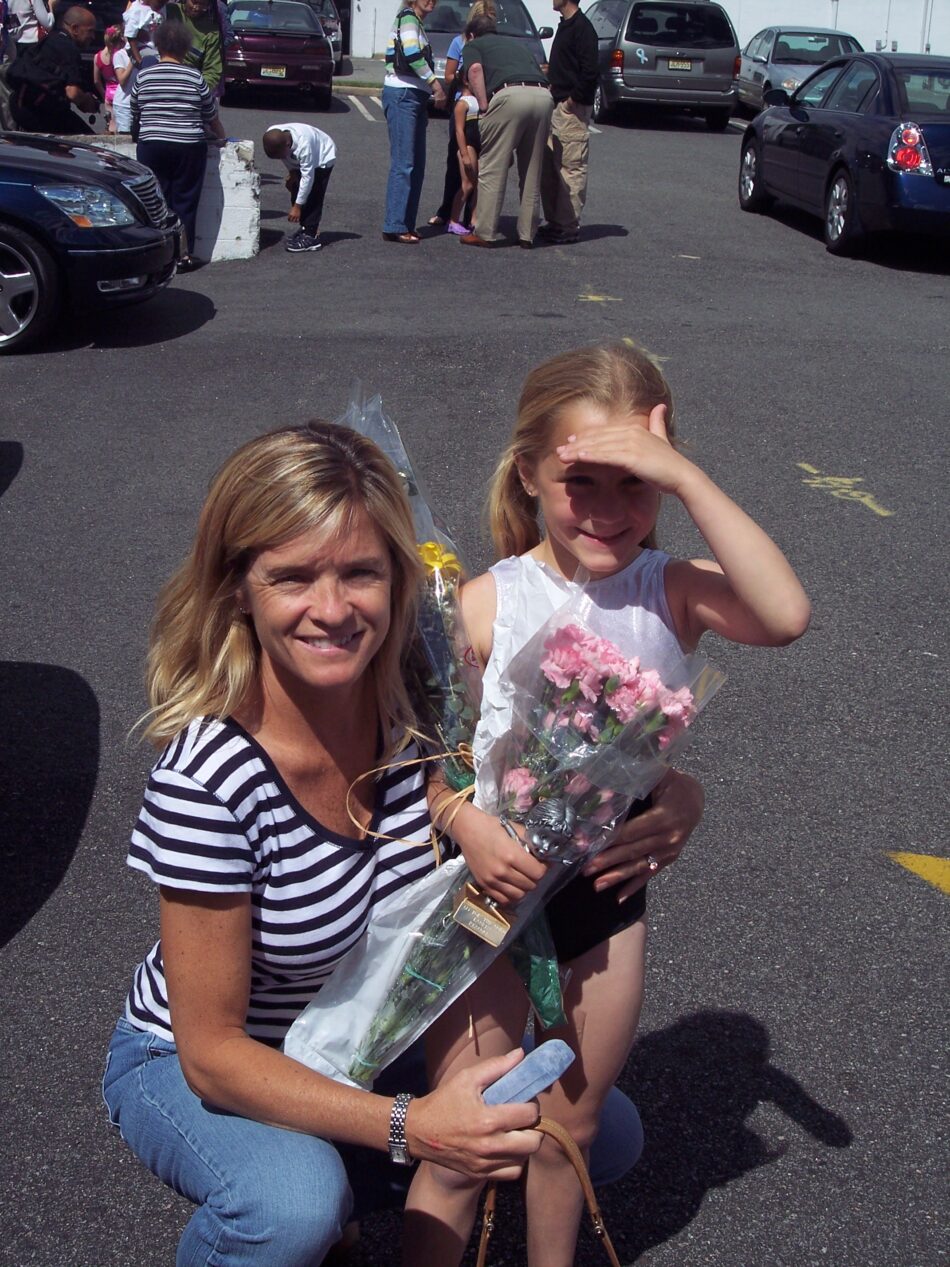Legos. Dress up. Playing Pretend. All things 6-year-olds love. A childhood filled with exciting and colorful weekends, watching a sibling’s soccer game and playing with the neighbors once homework was finished. It sounds like the life, doesn’t it? But it wasn’t mine.
From ages six to 12, I spent 24 hours a week at Go for the Gold Gymnastics, a warehouse off the highway with giant garage doors and gymnastics equipment spread out at random under heavy fluorescents. Every weekday morning, I woke up and went to school from 8 a.m. until 2 p.m.. Then I went to gymnastics from 4 to 8 p.m. On weekends, I either traveled to a new part of New Jersey for competitions or spent 10 hours a day in the gym.
I didn’t have a lot of free time to play with barbies or my classmates outside of school. My childhood was filled with chalk, blistered hands, leotards that ride up, a hair-sprayed high ponytail, and pointed toes. I spent most of my time flipping and bouncing in the hopes that I would earn a 10 out of 10 on the judges’ tiny scoreboards.
Now I’m 23, and certain behaviors from gymnastics have stuck with me throughout my life. I always ask if I can use the restroom because my coach thought the word bathroom was unprofessional. Every time I do something correctly, I make sure to do it again over and over to make sure I don’t lose it. When I walk around the house, I always find my chin up, shoulders back and stiff and my palms sweaty.

Lauren winning first place on vault at the 2010 New Jersey Level 6 State Championships for age 11 girls. She won second place All Around as well. January 31, 2010.
Nearly every athlete at the Olympics describes how they spent their entire childhood working to get to where they are now. They talk about how, without their sport, they wouldn’t be who they are today. For Simone Biles, Shawn Johnson and Sunisa Lee it all paid off. But what about me?
I missed sleepovers, summer camp and hangouts every weekend. I trained five to six days a week and spent my Sundays competing all over New Jersey. I faked a smile, never painted my nails and climbed the rope every time I messed up my floor routine at practice. I can’t help but ask myself where it got me. Sure, I’m not a failure, but I’m not a gymnast either. What did I gain from years of physically straining my body and sacrificing a balanced adolescent life?
The truth is, there are so many people like me- so many people who dedicated their childhood to working hard instead of just being a kid. So many people who didn’t land a brand deal with Subway and national fame. The ribbons and medals were nice and shiny, but I was robbed of building meaningful connections with people. Besides that, I was a young girl who didn’t know who she was without gymnastics.
I eventually dropped the sport when I was 12 because of the “twisties,” a term for when a gymnast gets a mental block that does not allow their body to perform anymore. I just spent hours staring at the bar, beam or vault frozen in fear. Instead of jumping on the springboard and gracefully tumbling over it, I’d run down the vault track and crash into the horse. I’m lucky to have had parents who supported my decision to stop when I fell out of love with gymnastics, but when I told my coaches that I was quitting they barely looked me in the eyes. They told me I would regret this for the rest of my life. I was 12 years old. Simon Biles announced she had the “twisties” at the Summer 2021 Olympics, and she was applauded for her decision to drop out and take care of herself. Mental Health matters, but only when you’ve made it to the top I guess.

Lauren with coaches Vivian (left) and Juan (right) after competing at
The Shining Stars invitational. January 6, 2008.
Gymnasiums need rules that will protect child athletes and limit the amount of time a child or teen athlete can train per week. As it is, parents and coaches alone determine a child’s schedule. If state regulations were created it would allow athletes to have their own time for a life outside practice.
Project Play’s Children’s Bill of Rights in Sports was developed by human rights and sports policy experts, and it corroborates the argument that former child athletes like myself are making, that children need to be allowed to be children first. The bill has eight rights, with number four emphasizing the need for developmentally appropriate play.
“Children have a right to play at a level commensurate with their physical, mental and emotional maturity, and their emerging athletic ability,” the bill says. “They should be treated as young people first, athletes second.”
Besides providing more time for kids to just be kids, this will level the playing field. If everyone has the same amount of time to practice each week this will ensure everyone has a fair and equal chance at succeeding. It will also allow more time for child athletes to relax, rest and focus on improving their mental health, which is just as important as physical health in the sports world. There are regulations for child actors, why not child athletes?
Coaches and competitive training centers need to emphasize the small percentage of athletes who make it to the top. According to the NCCA, less than two percent of student-athletes make it pro. It’s important to tell young people to follow their dreams, but if their dedication to a sport is impacting their mental health and ability to grow in other ways, then maybe they should be encouraged to consider other career and life options.
Finally, the gymnastics world needs guidance counselors and human resource representatives in gymnastics. There needs to be an outlet besides a coach or a parent that an athlete can go to for open and honest communication. There are conversations that children need to have that they might not be comfortable having with a parent or a coach. Children need proper resources to ensure their health and protection. It would also give children a safe space to speak up if there are incidents with peers or coaches.
Gymnastics made me who I am today, but it also defined me when I was a child. Those are two very different things.


